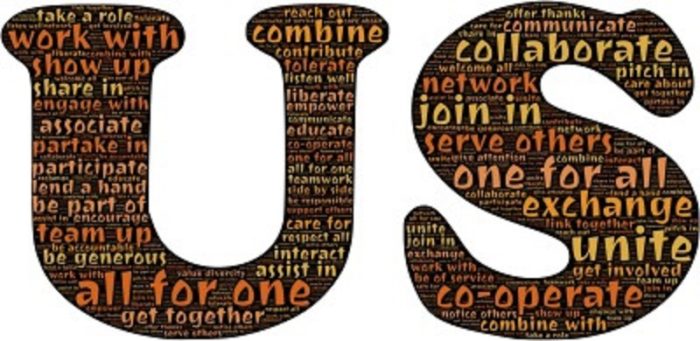The Making of ‘Us’
America is the only nation in the world that is founded on a creed. That creed is set forth with dogmatic and even theological lucidity in the Declaration of Independence; perhaps the only piece of practical politics that is also theoretical politics and also great literature. It enunciates that all men are equal in their claim to justice, that governments exist to give them that justice … Nobody expects a modern political system to proceed logically in the application of such dogmas, and in the matter of God and Government it is naturally God whose claim is taken more lightly. The point is that there is a creed, if not about divine, at least about human things. G.K. Chesterton, What I Saw in America
I open with this quotation for two reasons. The first is that today is July 4, and it is appropriate to Independence Day. The second is that, like Independence Day, it points to the creation of a nation. Nations, though somewhat maligned as, for example, a proximate cause of World War I, stand as the largest cohesive group yet formed by humanity. (Empires, though generally larger, possess unity no deeper than the edge of a sword – hence the inevitable dissolution of all empires, usually in short order.) Groups are defined by common identity. National identity is only an unusually modern way of defining us.
The oldest method of creating a broad us is through blood, through a concept of family expanded to include  thousands. Clans, tribes, kinship groups: all have been societies unto themselves, holding political power and social organization within a web of kinship. Common ancestry, real or invented, is an effective way of forging identity and unity, and a tenacious one. Even today, ethnic violence is often a reversion to tribal divisions, whose bonds prove stronger than overlying national identities.
thousands. Clans, tribes, kinship groups: all have been societies unto themselves, holding political power and social organization within a web of kinship. Common ancestry, real or invented, is an effective way of forging identity and unity, and a tenacious one. Even today, ethnic violence is often a reversion to tribal divisions, whose bonds prove stronger than overlying national identities.
Religion also forms a basis for groups and for identity. Some religions (it isn’t true of all) transcend divisions by ancestry to create a broader identity. Islam, at its birth in the Arabian peninsula, did this; the Koran specifically forbids violence against fellow Muslims of different tribes. Christianity used to be a powerful force of cohesion in the West, a common source of moral standards, metaphysical beliefs, and – in such forms as music and literature – culture.
National identity followed the rise of the nation-state. National identity encompasses any attribute or characteristic people wish to claim, from speaking Gaelic to fine cuisine to the Declaration of Independence. It often includes common ancestry or religion but often transcends them as well. The Reformation broke the religious homogeneity of Europe, and America never had much in the way of ethnic homogeneity; national identity is another avenue to unity.
By all these things we forge identity, and by identity we create the us, and Man must have the us. The trick of it all is that if there is an us, there must also be a them. What bridges one gap may deepen another; if the presence of a commonality is reason to spare someone, the absence of it may be a reason not to spare him. Nations have broadened beyond tribes, but not risen above tribal impulses.
So where do we go from here? Maybe you see evolution in all this and, with happy optimism, imagine that identities will grow broader and broader until they merge, in some distant utopia, into one universal identity. Maybe you think that that would be very nice, but unfortunately people aren’t, so it’s more likely that a regression into primitive loyalties and narrow identities will create a dystopia. Maybe you think that another basis of common identity is possible, whether culture or secular creeds or social class (Workers of the world, unite!).
Whatever you think or imagine about the thorny issue of communal identity, of this – as of everything else – stories are made.












































+1 Nice and thoughtful
Many nations have origins so old or complex it’s hard to say exactly when they began–for example, when was China first China? The warring states? The first empire? Sometime later? And when did Kiev, Moscow, and other warring city-states really become Russia? And when we talk of France, does its past as Roman Gaul count?
The story of the United States is simpler. Our nation was the first of the European colonies in the Americas to declare its independence–the first indicator that colonialism would not be a permanent state of affairs in world history. Elected representatives made a deliberate decision to separate from Great Britain at a specific time, a document first signed by anyone on July 4th, 1776.
But many nations declared independence from colonial powers after the USA, many of whom adopted language similar to the US Declaration of Independence. The Mexican declaration of independence, by no means the one most similar to the American one, says in part: “Restored then this part of the North to the exercise of all the rights given by the Author of Nature and recognized as unalienable and sacred by the civilized nations of the Earth, in liberty to constitute itself in the manner which best suits its happiness and through representatives who can manifest its will and plans, it begins to make use of such precious gifts…”
In referring to “gifts” and to the “Author of Nature” the Mexican Declaration of Independence seems to me to be every bit as much of a creed as that of the United States. (While G. K. Chesterton is always interesting, he was prone to hyperbole and often, I would say, was wrong.)
What makes the United States special is not being the only nation with a creed–what has provided the basis for its sense of community is common adherence to ideals (or ideas). It has always believed in liberty and democracy and always been at least superficially pious towards God–though it has redefined the first two terms from their original usage (which I think is mostly good) and is less pious than in the past (which I think is mostly bad).
Please note that the USA is currently more divided on what its ideals are since any time after our Civil War. The red state, blue state divisions, Trump supporter, Trump hater divisions are huge.
If history marches on that long, will the United States still be a nation 200 years from now? 100 years? 50?
I don’t know, but I’ve been doubting it for a while now.